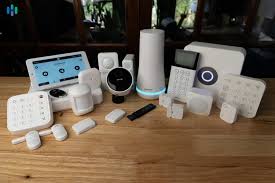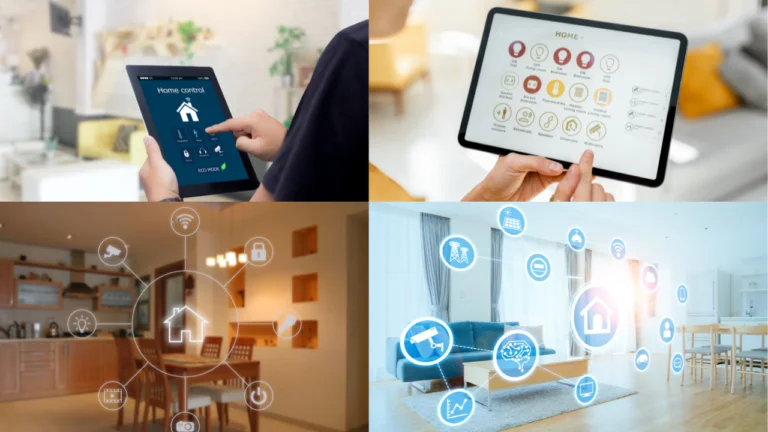
Do I really need a home security system?
With the Continuous Advancement in Technology and the increasing prevalence of property crimes, the need for home security systems has become more critical than ever.
Building an Home Security System is essential for maintaining a secure environment. They act as a deterrent to criminal activity, ensuring that any potential wrongdoers think twice before targeting a property. These home security systems services also play a crucial role in emergencies.
Urbanization and the associated increase in housing density have also played a role in the growing need for security measures. As more people move into urban and suburban areas, the potential for criminal activity can rise, making the installation of home security systems a practical consideration for homeowners seeking to protect their assets and loved ones.
Home security systems have become essential in Modern Indian households. With increasing concerns over break-ins, unattended deliveries, and unverified visitors, homeowners are seeking reliable ways to safeguard their families and property. From basic alarms to advanced smart systems, today’s home security solutions offer custom controls and real-time alerts for greater peace of mind.

This blog explores the key types of home security systems and their standout features.
What is a Home Security System?
The most basic definition of any security system is found in its name. It is literally a means or method by which something is secured through a system of interworking components and devices. A home security system is a group of connected devices such as sensors, alarms, cameras, and control panels that work together to protect your home from theft or emergencies. These systems are generally divided into four main types: wired, wireless, monitored, and unmonitored.
Types of Home Security Systems
Home security systems come in different forms to suit the needs of each home. They range from basic wired alarms to advanced smart systems. Here’s a closer look at the main types.
1. Wired Home Security Systems
Wired alarm systems are traditional home security setups that use physical cables to connect cameras, sensors, and alarms to a control panel. They are ideal for permanent homes and those seeking a secure, tamper-proof system.
Key features:
- Stable and reliable connection
- Suitable for large or multi-storey homes
- Requires professional installation
- Often connected to landline monitoring
2. Wireless Security Systems
A wireless home security system connects devices via Wi-Fi or cellular networks. It’s popular in modern homes and ideal for renters or tech-savvy users because of its smart features and portability.
Key features:
- Easy to install with minimal wiring
- Remote access via mobile apps
- Expandable with additional sensors and devices
- Sends instant alerts to your phone
3. Video Surveillance Systems (CCTV Cameras)
CCTV cameras are set up around your home to record and monitor activity. They often come with smart features like night vision and cloud storage. These systems are popular in gated communities and large apartments.
Key features:
- Live monitoring on phone or computer
- HD video recording and playback
- Night vision, motion detection, and cloud storage
- Helps deter intruders
4. Smart Doorbell Video Cameras
A video door camera is a popular security device that lets you see and speak to visitors from anywhere. Devices like GM Modular’s i-Cam offer a 100-degree view, making them a convenient and safe choice, especially for small families or seniors living alone.
Key features:
- Two-way communication with visitors
- Live video streaming via mobile app
- Motion-triggered recording
- Integrates with other smart home devices
5. Unmonitored Security Systems or Local Alarms
Unmonitored security systems don’t involve third-party monitoring. When triggered, they sound an alarm to alert the homeowner or scare off intruders. The homeowner is responsible for responding. These systems are best for small homes where people are usually present.
Key features:
- One-time installation cost
- No monthly fees
- Depends on the homeowner or neighbors to respond
6. Monitored Security Systems
Monitored security systems alert a professional company if there’s a security breach, and emergency responders are contacted. They’re ideal for high-security homes, villas, or houses where owners are frequently away.
Key features:
- 24/7 professional monitoring for peace of mind
- Quick police, fire, or medical response
- Monthly service fee
- Can connect with fire alarms and motion detectors
7. Motion Sensors and Intruder Alarms
Motion sensors and intruder alarms detect unauthorised movement near or inside your home, especially at entry points, and sound alarms. They are ideal for homes with large yards, wide entryways, or ground-floor access.
Key features:
- Detects movement using infrared or microwave sensors
- Connects with cameras and smart alerts
- Works indoors and outdoors
Don’t miss our Ultimate Guide to Choose the Right Home Security System.
Benefits of Home Security Systems
It’s natural to hesitate before investing in a home security system. Beyond deterring intruders, these systems offer:
- Peace of Mind: 24/7 protection for your family and belongings.
- Remote Monitoring: Keep an eye on your home from anywhere.
- Emergency Alerts: Instant notifications for fires, gas leaks, or break-ins.
- Insurance Savings: Discounts from some insurers for secured homes.
- Package Protection: Video doorbells ensure the safe delivery of parcels.
For more detailed guide, read our blog on the Top Benefits of Having a Home Security System.

Points to Remember When Selecting the Right Security System for Your Home
A complete home security system often includes video door cameras, motion detectors, smart lighting, and alarms. Choosing the right system depends on your needs.
Consider these factors:
- Home size: Larger homes may require wired systems with multiple sensors or an extensive wireless network.
- Lifestyle: Small families or frequent travelers benefit from smart or monitored systems.
- Internet access: Smart systems need stable Wi-Fi to function properly.
- Budget: Monitored and unmonitored systems are more affordable, while smart systems offer the most features if budget allows.
With changing lifestyles, home security is essential. Indian homeowners can choose from video door cameras, CCTV, motion sensors, and smart alarms.
Key Factors to Consider with a better understanding of Home Security System.

1. Assess Your Security Needs
- Determine the level of security required for your home.
- Identify vulnerable entry points like doors, windows, and garages.
- Consider whether you need indoor, outdoor, or a combination of security features.
- Evaluate how home automation can enhance security through scheduled routines and real-time monitoring.
2. Choose Between Wired and Wireless Systems
- Wired Systems: Ideal for permanent installations, reliable but require professional setup.
- Wireless Systems: Easy to install, scalable, and more adaptable for renters or frequent movers.
3. Look for Smart Integration Features
- Ensure compatibility with smart home devices like Amazon Alexa, Google Assistant, and Apple HomeKit.
- Integration with lighting, locks, and thermostats for enhanced automation.
- Mobile app control for remote access and real-time alerts.
- Automate security protocols like locking doors, turning on lights, and adjusting cameras when you leave home.
4. Consider Professional vs. DIY Monitoring
- Professional Monitoring: A third-party service continuously monitors your home and contacts authorities in case of an emergency.
- DIY Monitoring: Self-monitored systems send alerts to your phone, but response time depends on your availability.
- Smart automation can enhance DIY monitoring by triggering pre-set actions based on alerts.
5. Evaluate Camera and Sensor Options
- Indoor & Outdoor Cameras: Choose high-definition (HD) cameras with night vision and motion detection.
- Motion Sensors: Detect unusual movements and trigger alarms.
- Glass Break Sensors: Alert you if windows or doors are broken into.
- Doorbell Cameras: Allow real-time interaction with visitors and package monitoring.
- Automated surveillance can adjust camera angles and focus based on movement detection.
6. Ensure Reliable Connectivity and Power Backup
- Opt for security systems with dual connectivity (Wi-Fi & cellular) to prevent disruptions.
- Battery backup ensures continued protection during power outages.
- Home automation can optimize power management by switching devices to energy-saving mode when not in use.
7. Check for Cloud Storage & Data Security
- Cloud storage allows remote access to recorded footage.
- End-to-end encryption protects against hacking and unauthorized access.
- Subscription plans may be required for extended video storage.
- Automated data backup ensures continuous recording without manual intervention.
8. Look for User-Friendly Interface
- A simple and intuitive mobile app enhances usability.
- Voice commands and automation make controlling security features seamless.
- Smart dashboards provide real-time updates and customizable alerts.
9. Consider Expandability & Scalability
- A good security system should allow future upgrades.
- Ensure you can add more cameras, sensors, or smart devices as needed.
- Home automation helps streamline future expansions by maintaining centralized control over all connected devices.
10. Compare Pricing & Subscription Costs
- Some security systems require a one-time purchase, while others have monthly fees.
- Check for hidden costs related to cloud storage, professional monitoring, and hardware maintenance.
- Smart automation can help optimize costs by reducing energy consumption and minimizing unnecessary alerts.
Conclusion
- Choosing the right home security system involves balancing features, budget, and ease of use.
- Investing in a reliable security solution enhances safety and peace of mind for smart homeowners.
- Home automation plays a vital role in improving security efficiency and convenience.
YOu are welcome to connect with us by visiting our Resources for a better planning and Free guidance to your total HOme Security system
